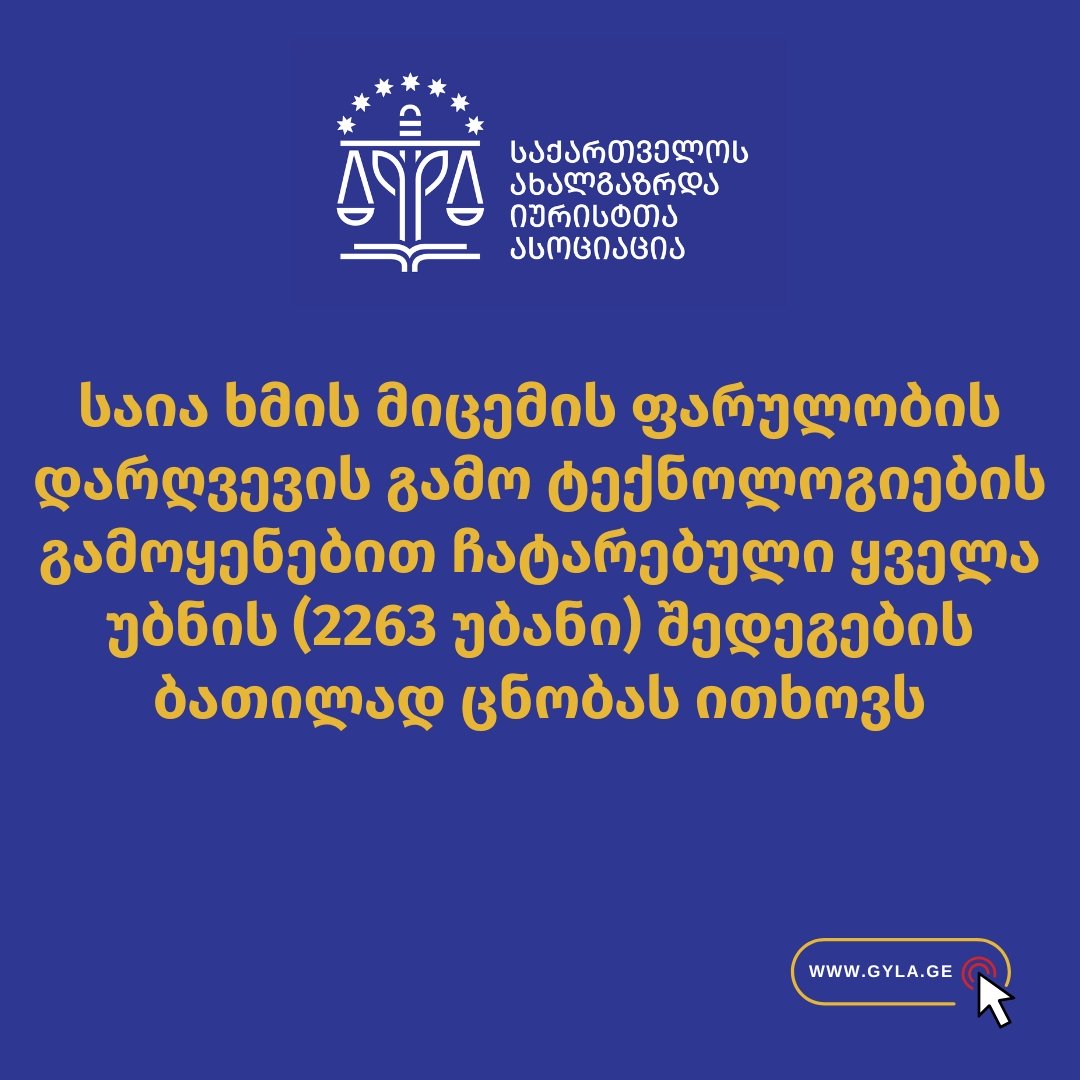NEWS

On October 29, the Georgian Young Lawyers' Association (GYLA) submitted complaints to district election commissions, requesting the annulment of results from all polling stations within the respective districts where elections were conducted using technology.
The acceptance of the complaints submitted by GYLA would result in new elections, as the annulment of results from the technological polling stations would significantly impact the overall election outcome.1
GYLA argues that the principle of voter secrecy was widely violated on election day, infringing upon the constitutional electoral rights guaranteed by the Constitution of Georgia.
Voter secrecy is a fundamental aspect of the constitutional right to vote,2 and when this principle is violated, the protection of that right becomes illusory. This guarantee, among other things, safeguards aspects related to the conduct of the electoral process at polling stations,3 including the instrumental means of exercising the right to vote, such as ballots and ballot boxes. According to the standards established by the OSCE Office for Democratic Institutions and Human Rights, the absolute secrecy of the vote must be upheld at all stages of the voting process, including at the moment the ballot is cast.4
The violation of the principle of secrecy also contravenes the European Convention, which states that "the High Contracting Parties undertake, at reasonable intervals, to hold free elections by secret ballot under conditions that ensure the free expression of the will of the people in the election of the legislative body."5 According to the practice of the European Court, this article is distinct from other fundamental rights outlined in the Convention and its additional protocols, as it governs the obligation of high contracting parties to conduct elections that ensure the free expression of the will of the people.6
It is important to note that the Venice Commission clearly indicated to the election administration of Georgia the necessity of implementing all necessary measures to ensure the secrecy of voting during the introduction of electronic technologies. However, the Central Election Commission (CEC) failed to protect this right on the day of voting for the 2024 parliamentary elections. Specifically, the ruling party, "Georgian Dream," installed video cameras at polling stations that, in some instances, were directed at the registrar's desks and verification machines, and in others, at the voting booths and the main ballot box. The quality of the ballots did not guarantee that they would not leave a coloured circle mark on the back. The combination of these two factors highlights the significant risks of influencing the voter's choice and undermines the principles of voting secrecy and free expression of will.
It is noteworthy that GYLA identified the risks of violating voter secrecy on election day during the training and informational meetings conducted by the CEC before the elections and addressed the CEC in advance to take appropriate measures to address this issue. In a letter dated September 28, 2024, No. 01-01/1607, GYLA was informed that the electoral ballot used during the training and informational meetings conducted by the CEC was a test version, while the quality of the ballot used on election day would be different, ensuring the protection of secrecy. However, this condition was not fulfilled.
Given the scale and systemic nature of the violations of voter secrecy, GYLA has also approached the Prosecutor's Office regarding the initiation of an investigation into these facts.
In total, GYLA's observation mission has submitted:
• 11 pertain to violations during the pre-election period;
• On election day, GYLA recorded 589 violations/bad practices;
• invalidation of summary protocols, in addition to the invalidity of results of 2263 precincts where electronic technologies were used, annulment of the results of 1 precincts where elections were held in a traditional manner;
• Annulment of the summary protocol of 460 precincts and recalculation of the results;
• In the case of 349 precincts, imposing disciplinary responsibility on the relevant precinct commission member.
1 Constitution of Georgia, Article 24.
2 შდრ. CCPR General Comment No. 25: Article 25 (Participation in Public Affairs and the Right to Vote), The Right to Participate in Public Affairs, Voting Rights and the Right of Equal Access to Public Service Adopted at the Fifty-seventh Session of the Human Rights Committee, on 12 July 19961, CCPR/C/21/Rev.1/Add.7, General Comment No. 25. (General Comments), par. 20.
3 Existing Commitments for Democratic Elections in OSCE Participating States, OSCE/ODIHR, 2003, available at: https://www.osce.org/files/f/documents/0/d/13956.pdf, accessed: 30.10.2024.
4 The European Convention on Human Rights (adopted on November 4, 1950, entered into force on September 3, 1953), Article 3 of the First Additional Protocol.
5 European Court of Human Rights, Guide on Article 3 of Protocol No. 1 to the European Convention on Human Rights, Right to free elections, 29.02.2024, § 11, available at: https://ks.echr.coe.int/documents/d/echr-ks/guide_art_3_protocol_1_eng, accessed: 29.10.2024.
6 According to Article 125, Paragraph 13 of the Election Code, if the voting results are annulled in more than half of the electoral districts due to significant violations of legal requirements, or in several districts where the total number of voters exceeds half of Georgia's total voter population, the election results are deemed void. In such cases, the Central Election Commission (CEC) is obligated to schedule new elections.
SHARE: